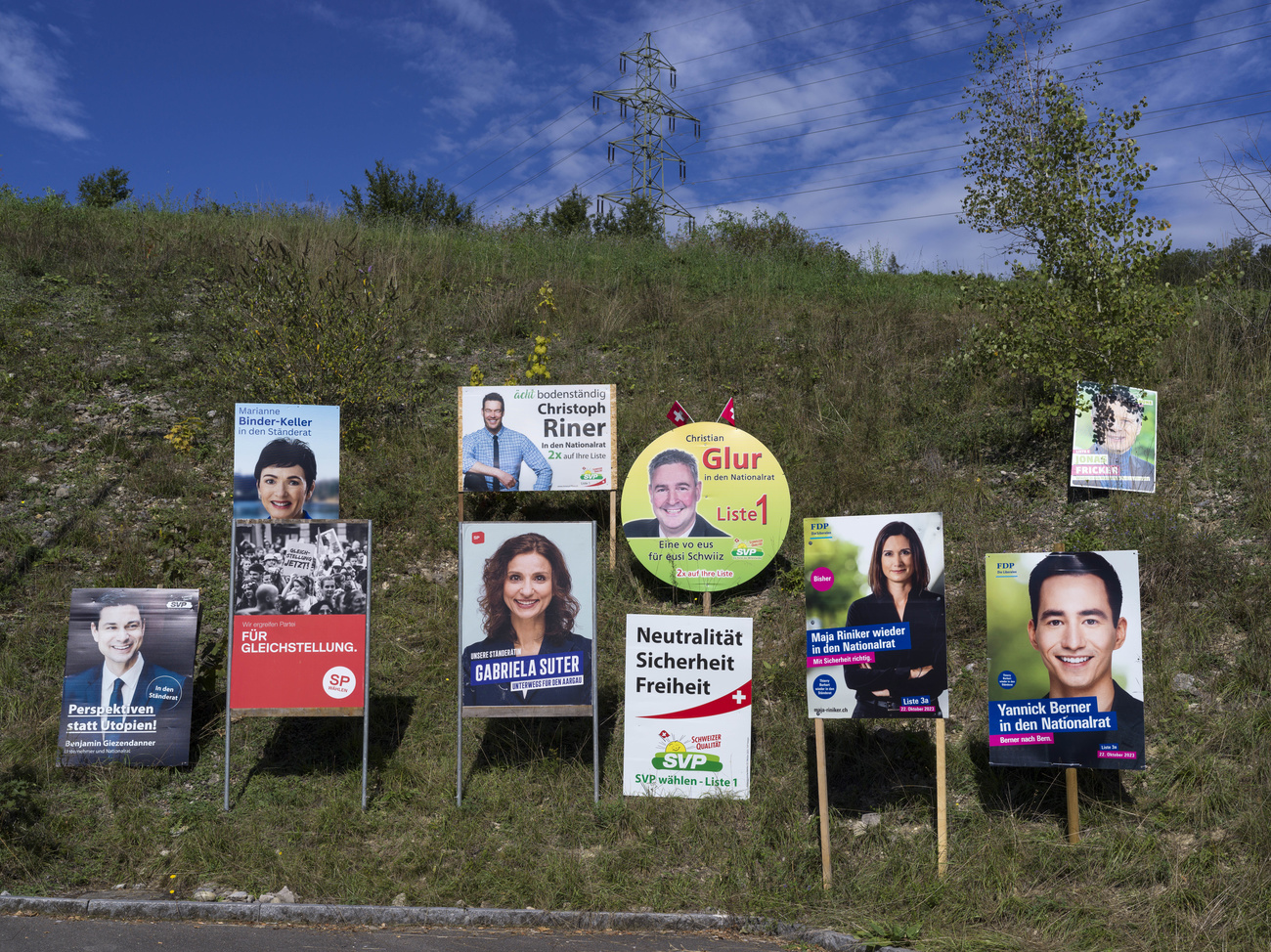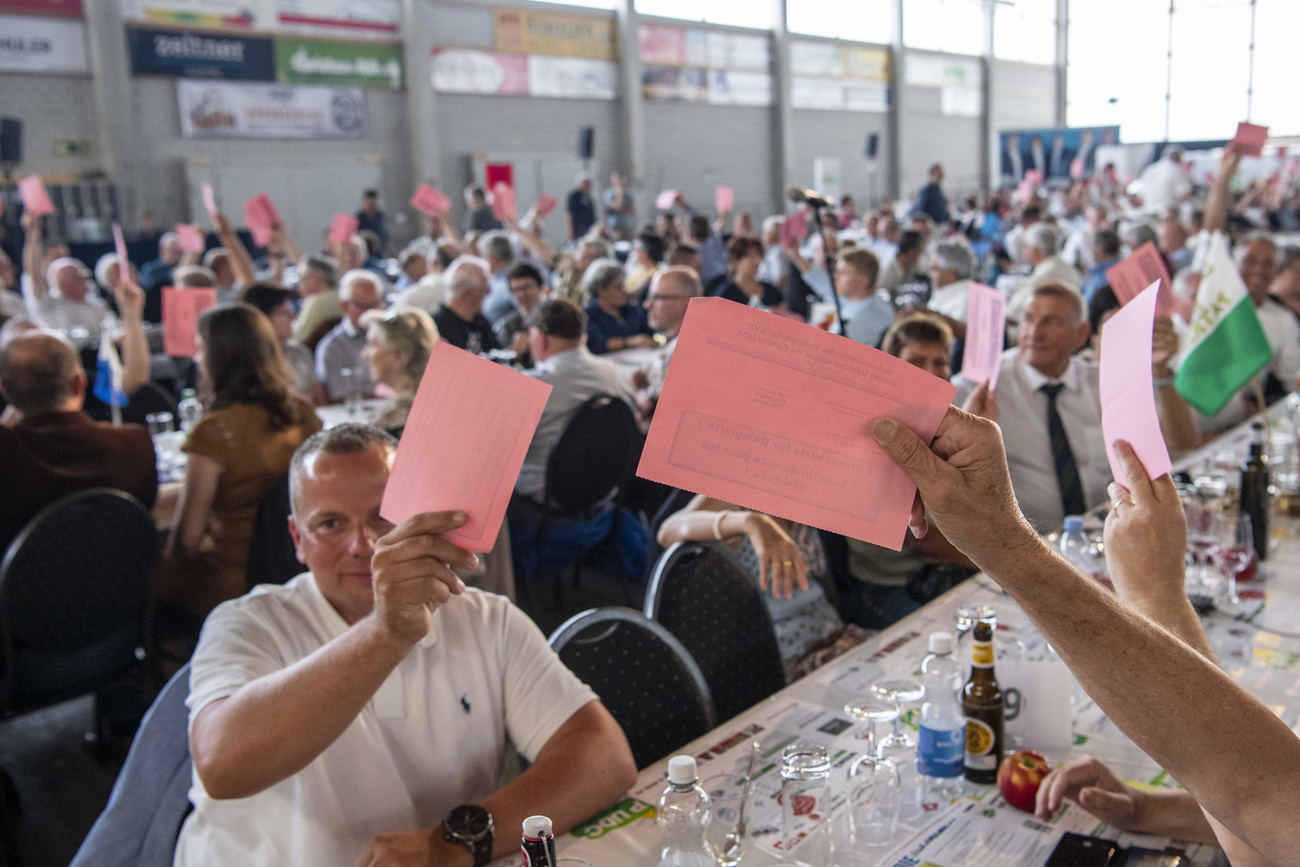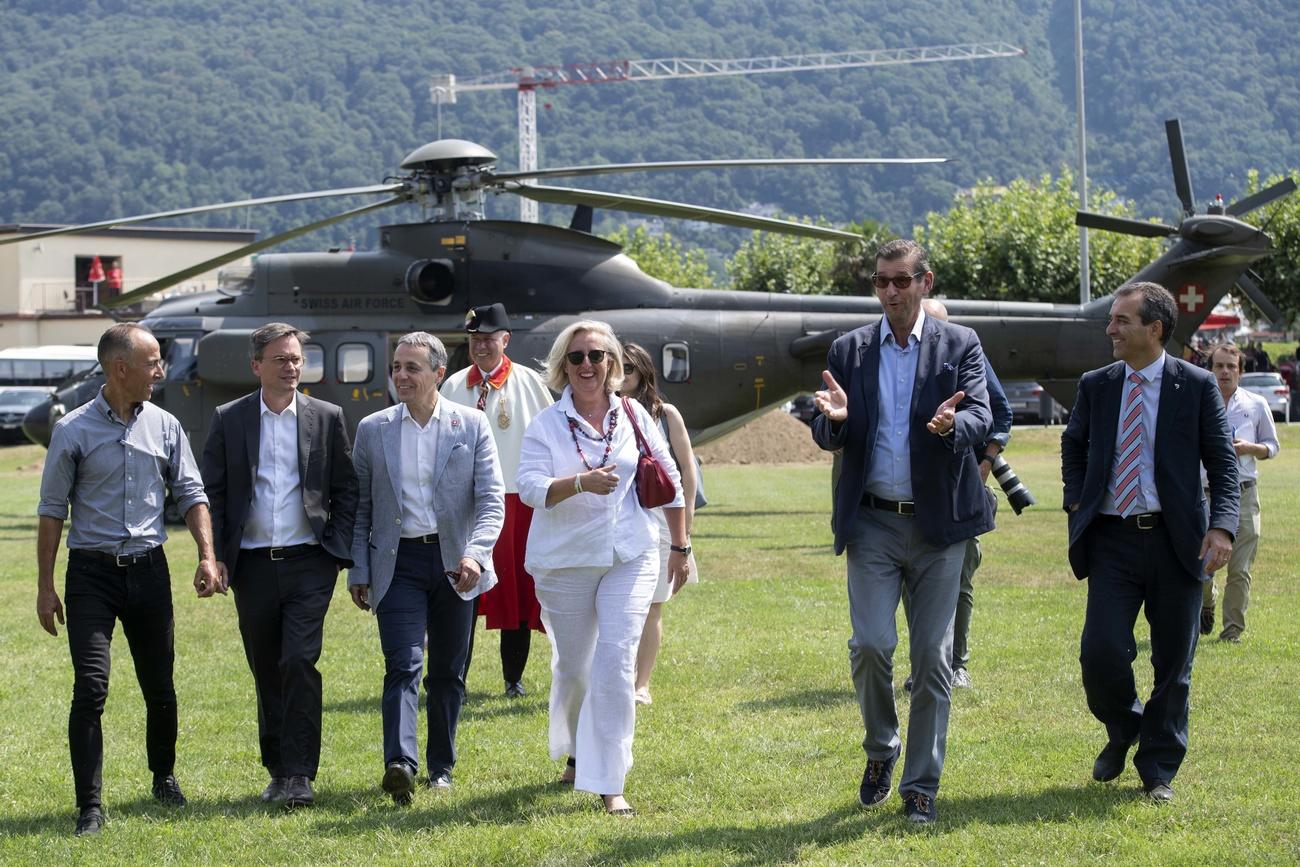Swiss election campaigns: ‘much more eventful than people imagine’

Election campaigns in Switzerland are not as boring as people abroad generally believe, says Zoé Kergomard, a French historian at the University of Zurich. In an interview she notes some surprising features of these “special moments” in democracy.
The election campaign for the federal elections on October 22 is in full swing. Yet the majority of the electorate shuns this major event in Swiss political life, and it attracts little interest from the media or academic world beyond the country’s borders.
Kergomard, who has immersed herself in Swiss electoral campaigns from the post-war period to the present day, says people should pay more attention.
SWI swissinfo.ch: Why are Swiss election campaigns of little to no interest abroad?
Zoé Kergomard: It’s to do with the workings of the Swiss political system, which is characterised by federalism and direct democracy. You get the impression that the country’s destiny is not determined by elections, but rather by referendums. What strikes me, as a French researcher based in Switzerland, is that even here, people don’t show much interest in these elections.

And yet these election campaigns are a special moment in the democratic life of the country, when political parties take the stage and try to forge links with the public. Unlike in referendums, which focus on clear questions, the parties are free to put forward any ideas that interest them.
That gives a snapshot of political debate in the country. But above all, when a party puts a specific issue on the agenda – environmental protection starting back in the 1960s, immigration, particularly since the 1980s, and so on – it can have long-term effects on the media and political agenda.
SWI: Voter turnout in Switzerland has been falling steadily for several decades and was at 45% in 2019. Would more flamboyant campaigns, such as those seen in the French presidential election, lead to higher turnout?
Z.K.: If we take the case of France, we’re dealing with an ailing democracy, as we saw this year with the tensions surrounding pension reform. It’s true that voter turnout is still fairly high for the presidential election, but it’s declining for all the other elections because people no longer see any point in them. This is the flipside of the extreme importance placed on the presidency in the French system.
In Switzerland, given the large number of ballots, abstention is generally intermittent: many citizens vote when the subject on the ballot interests them. While the rise in abstention in the 1960s and 1970s was a subject of debate at the time, the relatively low turnout at Swiss elections has since become almost normal and is not generally seen as a sign that people are disaffected by democracy.
SWI: So all is well with Switzerland’s semi-direct democracy?
Z.K.: The proposal to extend political rights to young people over the age of 16, for example, has been on the table for some years. Swiss election campaigns also highlight the situation in a country with high rates of immigration where almost a quarter of the population doesn’t have the right to vote at federal level – a result of a naturalisation policy that is among the most restrictive in Europe. This issue also gives rise to frequent debate.
Wherever you stand on this question, it’s clear that this exclusion has consequences for political participation in general. In places where people socialise, such as at work or in clubs, people inevitably talk less about politics if a part of the group cannot participate.
One of the paradoxes of Swiss political life is that politics is highly visible in the public arena, but the major political debates are not necessarily present in people’s day-to-day interactions.
SWI: What other peculiarities do you observe in Swiss election campaigns?
Z.K.: Political parties, which receive no state funding, have historically been weak in Switzerland, particularly compared with the biggest interest groups. People sometimes say that the weakness of the parties leads to unprofessional campaigns.
But behind the parties, business associations have long played a role in both referendum and election campaigns. In addition, the open list system encourages candidates to invest in their own campaigns.
The diversity of players involved in election campaigns has long made it difficult to assess campaign spending accurately. This year, for the first time, new rules on the transparency of political financing will apply to federal elections. It will be very interesting to examine the impact of these new rules.
SWI: The stability of the Swiss political landscape is another characteristic often mentioned abroad. But if we look at the changes in party strength since the early 1990s, we see some remarkable developments, in particular the strong growth of the environmental parties and the right-wing Swiss People’s Party at the expense of the traditional parties. Is this trend underestimated?
Z.K.: Yes, it’s a marked contrast with the decades from 1940 to 1980. The fact remains that variations in votes are more likely to occur between parties that are politically close than between one bloc and another. The party system is particularly diverse in Switzerland, as we can see from the existence of two environmental parties – one more critical of the market economy, the other more in favour of it
SWI: The 1990s and 2000s also saw the People Party’s first controversial campaigns. Did this mark a lasting change in the way campaigns are conducted in Switzerland?
Z.K.: The campaigning practices used by the Swiss People’s Party are not new. As early as the 1950s, political parties began working with pollsters and advertisers. And there is a lot of continuity in mobilisation practices: parties have been using posters since the 1920s to be visible in the public space.
The polemical nature of People’s Party campaigns is nothing new either. As far back as 1979, for example, the Radical Party ran a campaign that was described as “American”, based on the neoliberal slogan “more freedom, less government”. And during the Cold War, anti-communism, which was very pronounced in Switzerland, was often used to stigmatise left-wing parties.
Personal attacks also feature throughout election history. After the introduction of women’s suffrage at a federal level in 1971, the first female candidates were subjected to sexist attacks in the press and anonymous letters calling for their names to be struck off the lists.
SWI: In 2007 violence occurred during the campaign. Thugs affiliated to the extreme left attacked a People’s Party demonstration on Parliament Square. Was this an unprecedented occurrence in the history of Swiss election campaigns?
Z.K.: The rhetoric around the culture of “consensus” certainly has a moderating effect on the behaviour of political players. In 2007, both the use of violence and the xenophobic excesses of the People’s Party campaign in question were condemned.
But such incidents are not unique, particularly in the turbulent context of the protest movements of the 1960s and 1970s. In 1971, for example, young apprentices from the Hydra group, accompanied by Italian workers, disrupted an election rally by the far-right leader James Schwarzenbach, and claimed their place in Swiss democracy.
To sum up, Swiss election campaigns have often been much more eventful than is generally imagined, with major democratic issues at stake: who participates, who represents whom, and which political problems will be priorities in the years to come.
Edited by Mark Livingston. Translated from French by Catherine Hickley/ts

In compliance with the JTI standards
More: SWI swissinfo.ch certified by the Journalism Trust Initiative












You can find an overview of ongoing debates with our journalists here . Please join us!
If you want to start a conversation about a topic raised in this article or want to report factual errors, email us at english@swissinfo.ch.